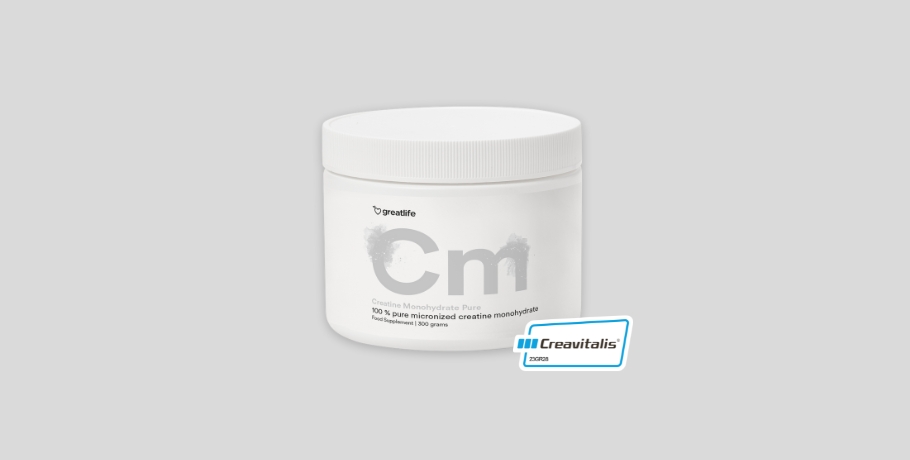
All About Creatine
Learn everything you need to know about creatine and its effects on the body in our comprehensive article on creatine, creatine monohydrate, dosage, side effects, and much more.
What is Creatine?
Creatine is a naturally occurring substance in the body that plays a crucial role in energy production in the muscles. It is particularly known for its role in quick and explosive movements, making it popular among athletes and fitness enthusiasts. But what is creatine exactly and why is it so common in training and sports? Creatine is a compound naturally found in the body, mainly in the muscles. It serves as an energy reserve that can quickly be converted into adenosine triphosphate (ATP), which is the body's primary energy source for muscle contractions. When we perform fast and powerful movements, such as sprinting or lifting, our muscles require a lot of ATP. Creatine then plays a key role by contributing to faster ATP regeneration, allowing the muscles to perform at a higher level during short, intense activities.
What is Creatine Monohydrate?
Creatine monohydrate is the most common form of creatine supplement on the market. It is a stable and water-soluble form of creatine that is easily absorbed by the body. Creatine monohydrate consists of a creatine molecule bound to a water molecule, which is why it is also called "creatine with a hydrate." The only difference between creatine and creatine monohydrate is essentially the water content. Creatine (C4H9N3O2) contains no water molecules, while creatine monohydrate contains one water molecule per compound molecule (C4H9N3O2 x H2O). When you take creatine monohydrate as a dietary supplement, the amount of creatine in the muscles increases, which can lead to increased muscle strength and better performance during training. Many studies have shown that regular use of creatine monohydrate can increase muscle mass and strength, improve recovery time after exercise, and enhance overall performance during high-intensity training. Additionally, creatine monohydrate is relatively affordable and has few or no side effects when taken at the correct dosage.
The Effect of Creatine
Creatine is a popular dietary supplement among athletes and fitness enthusiasts because of its ability to enhance performance. It serves as an energy reserve for fast and explosive movements, making it particularly effective for activities that require brief and intense exertion, such as strength training and sprinting.
Creatine has also been shown to have positive effects on brain function. Research has linked creatine supplementation to improved cognitive performance, memory, and mental focus. This can be especially beneficial for individuals studying or working in situations that require sharp thinking and concentration.
When it comes to older individuals, creatine has been found to be particularly beneficial. Aging is associated with decreased muscle mass and strength, which can lead to an increased risk of falls and decreased quality of life. Creatine supplementation has been shown to help improve muscle function and strength in older adults. It can also have positive effects on bone health and reduce the risk of osteoporosis.
Creatine Dosage
The most common dosage for creatine supplements is to load with about 20 grams per day divided into smaller doses over 5-7 days, followed by a maintenance dose of about 3-5 grams per day to maintain creatine levels in the muscles. However, we recommend 5 grams per day continuously instead of loading.
How & When to Take Creatine
Creatine is usually taken as a supplement in powder form mixed with water or juice. It is best to take creatine with a meal or immediately after exercise to maximize absorption. If you are loading with creatine, distribute the doses throughout the day for best effect.
Creatine Side Effects
Common side effects of creatine include mild and transient stomach discomfort. It is important to drink enough water when taking creatine to avoid dehydration and keep the muscles well hydrated.
Pros and Cons of Creatine
The benefits of creatine supplementation include increased muscle mass and strength, improved performance during intense workouts, and faster recovery time. On the other hand, potential drawbacks may include the aforementioned side effects and increased weight due to water retention. It is important to weigh the pros and cons and consult an expert before starting to use creatine.
Best Creatine
The finest, purest, and most bioavailable creatine we have found on the market is Creatine Monohydrate Pure with 100 % Creavitalis® Creatine Monohydrate.
